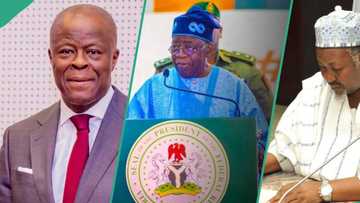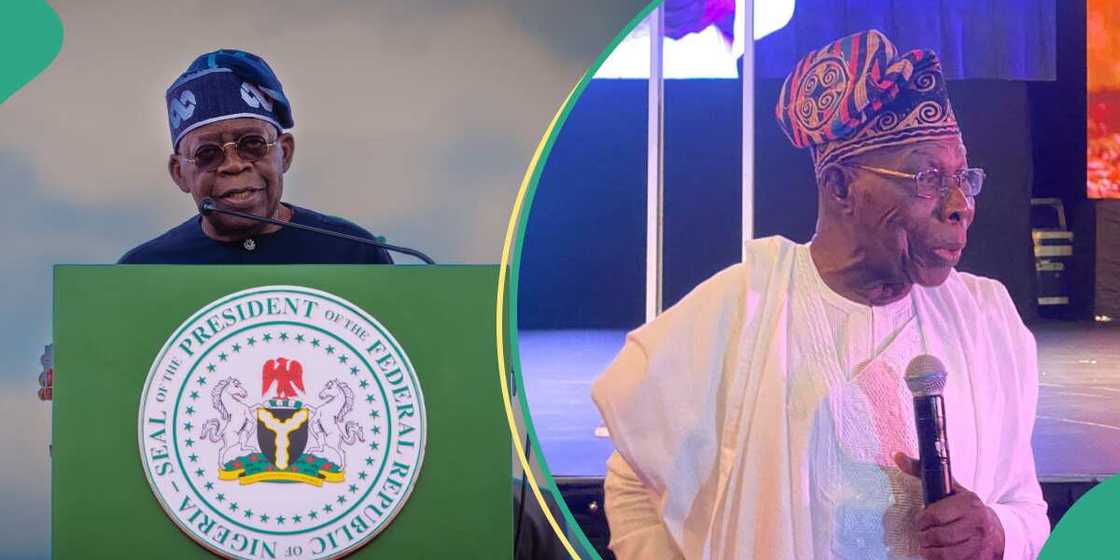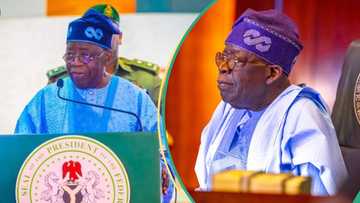"Nigeria, We Hail Thee": How Tinubu, Obasanjo Renewed Cold War
- President Bola Tinubu and former President Olusegun Obasanjo have tactically resumed their cold war in the Nigeria political space
- Obasanjo has recently been seen making cryptic comments and subtle criticism of Tinubu's administration while meeting some PDP governors at the same time
- On his part, Tinubu took away one major legacy of Obasanjo, which was the removal of the Arise O' Compatriots national anthem introduced by the latter during his military regime in 1979
PAY ATTENTION: Legit.ng Entertainment Awards 2024 Voting Is Alive. Choose the best entertainer in 15 categories for FREE.
Legit.ng journalist Bada Yusuf is an accomplished politics and current affairs editor, boasting over seven years of experience in journalism and writing.
President Bola Tinubu signed the national anthem Bill into law on Wednesday, May 29. The bill returns the country to its old national anthem, 'Nigeria, we hail thee.'

Read also
Full list: Analyst names Wale Edun among Tinubu's worst performing ministers, video emerges
The bill repeals the "Arise I Compatriot," introduced by former President Olusegun Obasanjo during his military era in 1979.

Source: Twitter
How Obasanjo, Tinubu's cold war started
Tinubu and Obasanjo have been political enemies since the return of democracy in 1999 when the latter was president of the country and the former, governor of Lagos state.
PAY ATTENTION: Click “See First” under the “Following” tab to see Legit.ng News on your Facebook News Feed!
Tinubu had created more local councils to bring governance to the grassroots, which Obasanjo opposed and withheld the state allocation throughout his tenure in office.
Of course, Tinubu was the opposition leader with the defunct Alliance for Democracy (AD), while Obasanjo was in the then-ruling party, the Peoples Democratic Party (PDP).
While Obasanjo did everything to take over Lagos from Tinubu when he was in power, particularly during the 2003 and 2007 elections, the former governor of Lagos was working to have federal power.
How Obasanjo began to attack Tinubu
Sixteen years later, Obasanjo is out of power, and Tinubu is the president. But, the two southwest politicians appear to have resumed their battle for supremacy in the region.
Obasanjo has been making cryptic comments and subtle criticism of President Tinubu's administration. One such criticism was his comment on removing the fuel subsidy and unifying the exchange rate.
The former president said:
“Today, the government has taken three decisions, two of which are necessary but wrongly and thoughtlessly implemented and have led to the impoverisation of the economy and of Nigerians. These are removal of subsidy, closing the gap between black market and official rates of exchange, and the third is dealing with a military coup in Niger Republic.”
At the same time, the former president is tactically relating with some governors of the PDP in what looks like a steady political come. Some of such moments include his recent dance with Governor Ademola Adeleke of Osun state and the commissioning of a project in Adamawa.
How Tinubu responded to Obasanjo's criticism
On his part, Tinubu removed one significant legacy of the former president, the "Arise O' Compatriots" national anthem, which was introduced during his military regime. He reintroduced the former anthem Nigeria inherited from its colonial masters, "Nigeria, We Hail Thee".
The outgone anthem, "Arise, O Compatriots," has been sung at public functions since 1978. "Nigeria, We Hail Thee" was reintroduced after being adopted in 1960 as the first official national anthem. It was written by Miss Lillian Jean Williams, a Briton who lived in Nigeria at independence.
The House of Representatives passed the National Anthem Bill 2024 last Thursday, May 23. The Senate passed the bill on Tuesday, May 28, and President Tinubu signed it on May 29. All in the space of one week.
Tinubu hints at fight with 36 governors
Legit.ng earlier reported that President Bola Tinubu commented on why the federal government sued the 36 governors.
The president gave the hint while addressing the leadership of the Arewa Consultative Forum on Thursday, May 30.
According to the president, governors need to prioritise local communities while lamenting the neglect of the local government.
Proofreading by Nkem Ikeke, journalist and copy editor at Legit.ng.
PAY ATTENTION: Donate to Legit Charity on Patreon. Your support matters!
Source: Legit.ng





